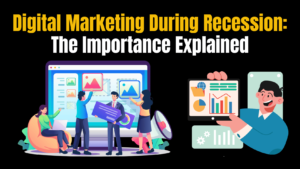Why Digital Marketing Is Crucial During Economic Uncertainty
In times of economic uncertainty, businesses often tighten their budgets, and marketing expenses are among the first to be cut. However, digital marketing is not only essential but becomes even more crucial during a recession. Let’s explore why.

Understanding the Shift
During a recession, consumer behavior undergoes a significant shift. People become more cautious with their spending and tend to research products and services thoroughly before making a purchase. This is where digital marketing plays a vital role.
Targeted Reach
One of the primary advantages of digital marketing is its ability to target specific audiences. Through tools like SEO, PPC, and social media advertising, businesses can reach their target demographics more effectively. By understanding consumer behavior and demographics, companies can tailor their marketing efforts to appeal directly to their audience’s needs and preferences.
Digital marketing, on the other hand, offers unparalleled precision in reaching specific demographics and audience segments. Through tools like search engine optimization (SEO), pay-per-click (PPC) advertising, and social media targeting, businesses can tailor their marketing efforts to reach the exact audience most likely to be interested in their offerings.
Search Engine Optimization (SEO): SEO is the practice of optimizing a website to rank higher in search engine results pages (SERPs) for relevant keywords and phrases. By understanding the search intent of their target audience, businesses can optimize their website’s content to attract organic traffic from users actively searching for products or services related to their industry.
Pay-Per-Click (PPC) Advertising: PPC advertising allows businesses to display ads to users based on their search queries or browsing behavior. Platforms like Google Ads and Bing Ads enable advertisers to target specific keywords, demographics, interests, and geographic locations, ensuring their ads are seen by the most relevant audience.
Social Media Targeting: Social media platforms like Facebook, Instagram, and LinkedIn offer robust targeting options that allow businesses to define their audience based on factors such as age, gender, location, interests, and behaviors. This enables advertisers to deliver highly personalized content to users who are most likely to engage with their brand.
By leveraging these digital marketing tactics, businesses can maximize their marketing ROI by focusing their efforts on the audience segments most likely to convert into customers. This targeted approach not only improves the efficiency of marketing campaigns but also enhances the overall user experience by delivering relevant content to consumers who are actively seeking it out.
Cost-Effectiveness
Traditional forms of advertising, such as television or print ads, can be expensive and may not provide the same level of targeting as digital marketing. During a recession, when budgets are tight, businesses need to allocate their resources wisely. Digital marketing offers a cost-effective solution, allowing companies to achieve better results with a smaller investment.
Measurable Results
Another advantage of digital marketing is its ability to provide measurable results. Unlike traditional forms of advertising, which can be challenging to track, digital marketing allows businesses to monitor the performance of their campaigns in real-time. This means companies can quickly identify what’s working and what’s not, allowing them to make adjustments as needed to optimize their results.
Building Brand Awareness
Maintaining visibility during a recession is essential for businesses to stay top-of-mind with consumers. Digital marketing provides an opportunity to build and maintain brand awareness even when budgets are limited. Through content marketing, social media, and email campaigns, companies can continue to engage with their audience and reinforce their brand messaging.
Adapting to Changing Trends
The digital landscape is constantly evolving, and businesses need to stay ahead of the curve to remain competitive. During a recession, consumer behavior may change rapidly, and companies must be able to adapt their marketing strategies accordingly. Digital marketing allows for greater flexibility, enabling businesses to pivot quickly in response to changing trends and market conditions.
Conclusion
In conclusion, digital marketing is not just important but becomes even more critical during a recession. By leveraging the targeted reach, cost-effectiveness, and measurable results of digital marketing, businesses can navigate economic downturns more effectively. Moreover, digital marketing allows companies to maintain brand awareness, adapt to changing trends, and ultimately, thrive in challenging economic times.
Stay on top of the latest AI trends and developments with Disrt Infotech.Contact us today to learn more about our Funnel & Branding services and how we can help your business succeed online.






